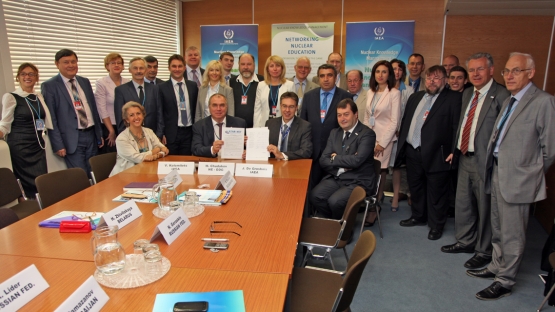With an agreement among 12 universities from six countries in Eastern Europe and Central Asia, the IAEA has facilitated the establishment of a fifth regional network for enhanced cooperation in promoting, building, managing and transferring nuclear knowledge.
The initiative that establishes the Regional Education and Training Network in Nuclear Technology, also known as STAR-NET, brings together leading universities from Armenia, Azerbaijan, Belarus, Kazakhstan, the Russian Federation and Ukraine to collaborate in their nuclear education programmes and nuclear industry-oriented training centres. The six IAEA Member States are currently home to 50 operational nuclear power reactors, with another 13 under construction.
“This translates into a rising demand for nuclear educational and training programmes to meet a continued necessity for highly qualified nuclear professionals,” said Mikhail Chudakov, IAEA Deputy Director General and Head of the Department of Nuclear Energy.
In tandem with the IAEA’s goals to advance human resource development and nuclear knowledge management, the STAR-NET network will involve interested stakeholders such as non-profit, non-governmental and non-political organisations to facilitate professional training and promote knowledge-sharing within the nuclear sector.
To play an active role in developing nuclear knowledge and in ensuring safety and the continued availability of qualified human resources in the field, STAR-NET members will also work towards reinforcing standardisation in university curricula. The new network will also facilitate more interaction in education and learning programmes to strengthen the synergy among national academic programmes.
Following the well-established European Nuclear Education Network ENEN, the IAEA nuclear knowledge management programme has so far supported the establishment and ongoing operation of three regional educational networks: The African Network for Education in Nuclear Science and Technology AFRA-NEST, the Asian Network for Education in Nuclear Technology ANENT, and the Latin-American Network for Education in Nuclear Technology LANENT.
“With the formation of STAR-NET, we are adding one more regional network to the list,” added Mr Chudakov. “So you are joining not just a regional, but a global community of nuclear education professionals.”
Representatives from the 12 participating universities signed the agreement to establish the network during the 59th IAEA General Conference in Vienna.






